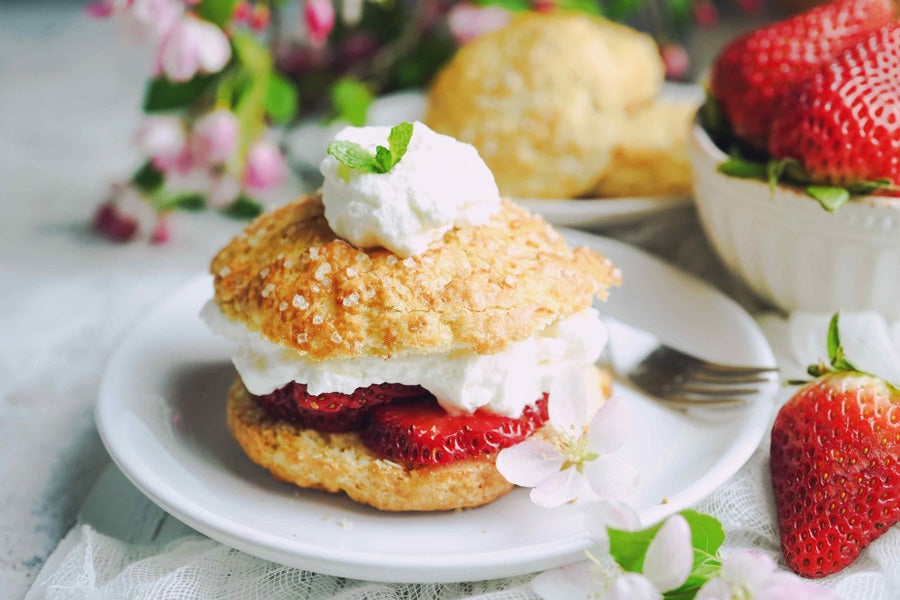Welcome to a berry delightful rendezvous where strawberries and oats collide in a tantalizing dance of flavors. Picture this: a luscious mound of strawberry shortcake, lovingly crafted with a healthy twist. But hold on tight because this isn't your grandma's traditional recipe. Oh no, we've taken a detour down the path of culinary innovation, and it's a scrumptious detour indeed!
Enter stage right: oat flour and vanilla protein powder, the dynamic duo that adds a whole new dimension to this classic treat. As the oat flour waltzes in with its rustic charm, bringing a subtle nuttiness and a soft, tender crumb, the vanilla protein powder struts alongside, flexing its muscles and delivering a protein-packed punch.
Together, they create a symphony of textures and flavors that'll have your taste buds cheering for an encore. So grab your forks and prepare to indulge in a guilt-free affair with this tantalizing twist on strawberry shortcake. Get ready to have your dessert dreams come true!
Servings 4 Servings
Preparation Time 15 Minutes
Baking Time 7 Minutes
Total Time 22 Minutes
Nutritional Facts
Calories 240 cal
Protein 24 g
Carbs 27 g
Fat 4 g
Ingredients
- 3/4 cup oat flour
- 2 scoops vanilla protein powder
- 1/2 cup eggwhites
- 1/2 tsp baking soda sweetener, as desired
- 1 cup nonfat Greek yogurt
- 1 cup fresh strawberries, diced
Instructions
- Set oven to 350 degrees Fahrenheit.
- Spray non-stick cooking spray into 4 large muffin tins.
- Combine protein powder, baking soda, and oat flour in a bowl.
- Add the sugar, if using, and the egg whites.
- Give the batter five minutes to rest.
- Divide the batter equally among the four muffin tins.
- around 7 minutes for baking.
- Slice strawberries while the shortcakes are baking.
- Remove the shortcakes from the oven after baking and let them cool for 5 minutes.
- Cut the muffin's top off with a knife, then scoop out some of the centers to form a "cup" shape.
- Fill the cake with Greek yogurt, top with strawberries, and finish with whipped cream, if desired!
Why We Used Oat Flour?
Oats are considered one of the most nutritious grains on the planet. Not only are they gluten-free, but they also provide a wealth of essential vitamins, minerals, antioxidants, and fiber. Oat flour is made by crushing the dried oats finely to form a powder. The benefits of oats and oat flour are somehow the same.
Here are some of those benefits!
Incredibly Nutritious
Oats are a well-balanced source of nutrients, containing carbs and fiber, including the potent fiber beta-glucan. Additionally, they provide high-quality protein with a good balance of essential amino acids.
One cup of oats contains 51 grams of carbs, 13 grams of protein, 5 grams of fat, and 8 grams of fiber, with just 303 calories. This nutrient composition makes oats one of the most nutrient-dense foods you can consume.
Rich in Antioxidants
Whole oats are a rich source of polyphenols and antioxidants, with the most significant group being avenanthramides. These unique antioxidants are primarily found in oats and have been studied for their potential health benefits. Research has shown that avenanthramides may assist in lowering blood pressure levels by boosting nitric oxide production.
This gas molecule widens blood vessels and enhances blood flow (as per several trusted sources). Moreover, avenanthramides have anti-inflammatory and anti-itching effects, making them a valuable addition to our diet.
Powerful Soluble Fiber
Beta-glucan is a type of soluble fiber found in oats that dissolve in water and form a thick gel-like solution in the gut. The consumption of beta-glucan fiber can provide several health benefits, including reducing LDL and total cholesterol levels.
It has also been shown to lower blood sugar and insulin response while increasing feelings of fullness. Additionally, incorporating beta-glucan into your diet may promote the growth of beneficial bacteria in the digestive tract.
Improve Blood Sugar Control
Type 2 diabetes is a prevalent health condition characterized by significantly high blood sugar levels due to decreased insulin sensitivity. Oats have been found to be beneficial in reducing blood sugar levels, particularly in overweight individuals and those with type 2 diabetes. Beta-glucan present in oats and barley may enhance insulin sensitivity.
However, a randomized clinical trial showed no such improvement, and more research is needed to confirm these findings. Beta-glucan's gel-forming ability is primarily responsible for slowing down stomach emptying and glucose absorption into the bloodstream, leading to these effects.
Help Lose Weight
Oatmeal is not only a scrumptious breakfast option but a satiating one too. Consuming filling foods can aid in weight loss by causing a reduction in calorie intake.
Oatmeal contains beta-glucan, which delays stomach emptying and increases feelings of fullness. Additionally, beta-glucan may promote the release of PYY, a gut hormone that reduces calorie consumption and decreases the risk of obesity.
The Bottom Line
This high-protein strawberry shortcake recipe is a mouth-watering delight that satisfies both your sweet tooth and protein needs. It's a perfect dessert option for anyone watching their health and fitness goals. You can enjoy a guilt-free dessert that tastes just as good as the traditional version by using healthy ingredients like oat flour, protein powder, Greek yogurt, and fresh strawberries.
So next time you crave something sweet, try this recipe and savor each delicious bite without any guilt!
Reading List
Sundried Tomato & Herb Scrambled Egg Grilled Cheese Recipe
Low-Calorie, High-Protein Vegetarian BBQ Cobb Salad Recipe
Chipotle Cheddar Quesadilla Recipe
Mexican Chopped Salad - A Delicious, Nutritious and Easy-To-Make Salad
Article Sources
- Bashir, Khawaja Muhammad Imran, and Jae-Suk Choi. "Clinical and Physiological Perspectives of β-Glucans: The Past, Present, and Future." International Journal of Molecular Sciences, vol. 18, no. 9, Sept. 2017, p. 1906. PubMed Central, https://doi.org/10.3390/ijms18091906.
- Hou, Qingtao, et al. "The Metabolic Effects of Oats Intake in Patients with Type 2 Diabetes: A Systematic Review and Meta-Analysis." Nutrients, vol. 7, no. 12, Dec. 2015, pp. 10369-87. PubMed Central, https://doi.org/10.3390/nu7125536.
- Kristensen, Mette, and Morten Georg Jensen. "Dietary Fibres in the Regulation of Appetite and Food Intake. Importance of Viscosity." Appetite, vol. 56, no. 1, Feb. 2011, pp. 65-70. PubMed, https://doi.org/10.1016/j.appet.2010.11.147.
- Liu, Liping, et al. "The Antiatherogenic Potential of Oat Phenolic Compounds." Atherosclerosis, vol. 175, no. 1, July 2004, pp. 39-49. PubMed, https://doi.org/10.1016/j.atherosclerosis.2004.01.044.
- Rasane, Prasad, et al. "Nutritional Advantages of Oats and Opportunities for Its Processing as Value Added Foods - a Review." Journal of Food Science and Technology, vol. 52, no. 2, Feb. 2015, pp. 662-75. PubMed Central, https://doi.org/10.1007/s13197-013-1072-1.
- Rebello, Candida J., et al. "Dietary Fiber and Satiety: The Effects of Oats on Satiety." Nutrition Reviews, vol. 74, no. 2, Feb. 2016, pp. 131-47. PubMed, https://doi.org/10.1093/nutrit/nuv063.
- Shen, Xiao Li, et al. "Effect of Oat Glucan Intake on Glycaemic Control and Insulin Sensitivity of Diabetic Patients: A Meta-Analysis of Randomized Controlled Trials." Nutrients, vol. 8, no. 1, Jan. 2016, p. 39. PubMed, https://doi.org/10.3390/nu8010039.
- Sur, Runa, et al. "Avenanthramides, Polyphenols from Oats, Exhibit Anti-Inflammatory and Anti-Itch Activity." Archives of Dermatological Research, vol. 300, no. 10, Nov. 2008, pp. 569-74. PubMed, https://doi.org/10.1007/s00403-008-0858-x.
- Svane, M. S., et al. "Peptide YY and Glucagon-like Peptide-1 Contribute to Decreased Food Intake after Roux-En-Y Gastric Bypass Surgery." International Journal of Obesity, vol. 40, no. 11, Nov. 2016, pp. 1699-706. www.nature.com, https://doi.org/10.1038/ijo.2016.121.
- Valeur, Jorgen, et al. "Oatmeal Porridge: Impact on Microflora-Associated Characteristics in Healthy Subjects." The British Journal of Nutrition, vol. 115, no. 1, Jan. 2016, pp. 62-67. PubMed, https://doi.org/10.1017/S0007114515004213.
- Zhang, Tianou, et al. "Absorption and Elimination of Oat Avenanthramides in Humans after Acute Consumption of Oat Cookies." Oxidative Medicine and Cellular Longevity, vol. 2017, 2017, p. 2056705. PubMed Central, https://doi.org/10.1155/2017/2056705.
- Zurbau, Andreea, et al. "The Effect of Oat β-Glucan on Postprandial Blood Glucose and Insulin Responses: A Systematic Review and Meta-Analysis." European Journal of Clinical Nutrition, vol. 75, no. 11, Nov. 2021, pp. 1540-54. www.nature.com, https://doi.org/10.1038/s41430-021-00875-9.











